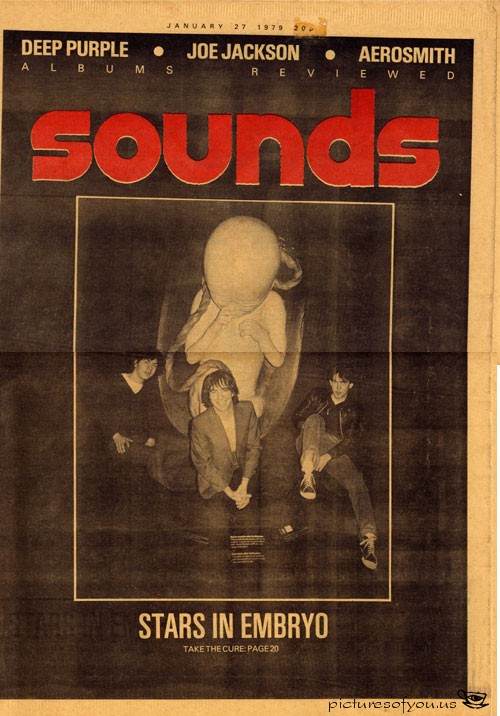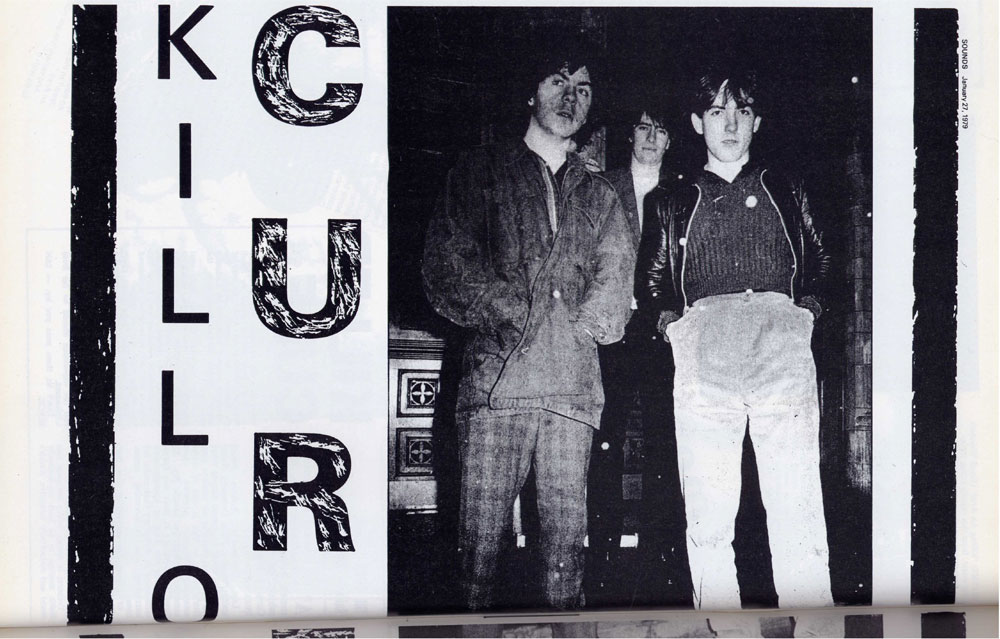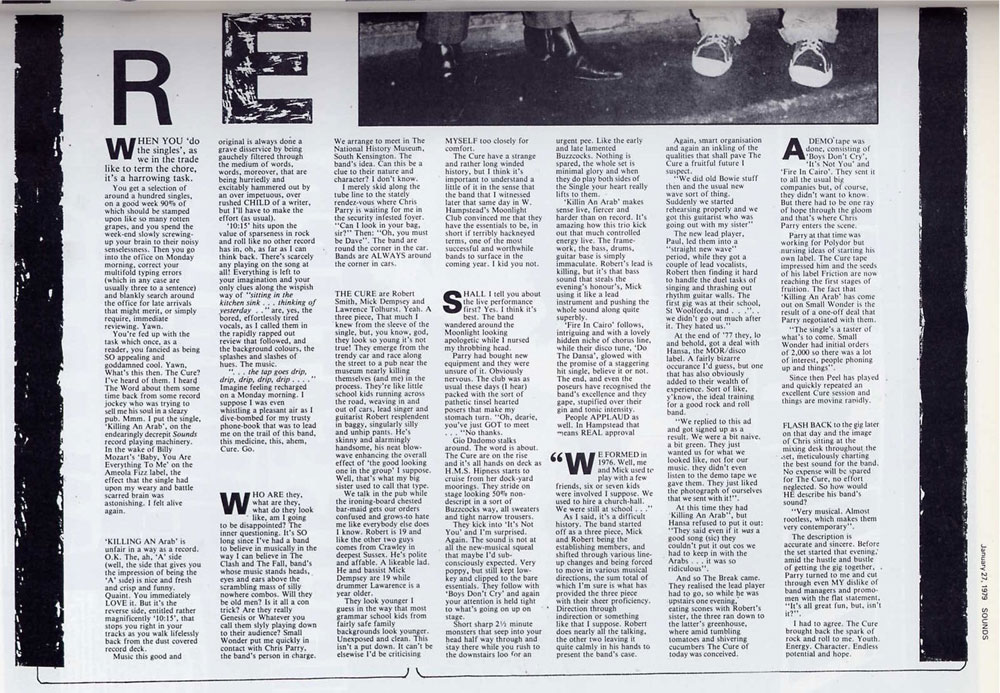Kill Or Cure
Interview / By: Dave McCullough



1/27/1979 - Sounds (UK) First Cover!
Kill Or Cure
Interview / By: Dave McCullough



1/27/1979 - Sounds (UK)
First Cover!
Kill Or Cure
Interview / By: Dave McCullough
When you
Ďdo the singlesí, as we in the trade like to term the chore, itís a harrowing
task.
You get a selection of around a hundred singles, on a good week 90% of which
should be stamped upon like so many rotten grapes, and you spend the week-end
slowly screwing-up your brain to their noisy senselessness. Then you go into the
office on Monday morning, correct your multifold typing errors (which in any
case are usually three to a sentence) and blankly search around the office for
late arrivals that might merit, or simply require, immediate reviewing. Yawn.
Youíre fed up with the task which once, as a reader, you fancied as being SO
appealing and goddamned cool. Yawn, Whatís this then. The Cure? Iíve heard of
them. I heard The Word about them some time back from some record jockey who was
trying to sell me his soul in a sleazy pub.
Mmm.
I put the single ĎKilling An Arabí, on the endearingly decrepit
Sounds
record playing machinery. In the wake of Billy Mozartís ĎBaby, You Are
Everything To Meí on the Ameola
Fizz label, the effect that the single had upon my weary and battle scarred
brain was astonishing. I felt alive again.
ĎKilling An Arabí is unfair in a way as a record. O.K. The, ah, ĎAí side (well,
the side that gives you the impression of being the ĎAí side) is nice and fresh
and crisp and funny. Quaint. You immediately LOVE it. But itís the reverse side,
entitled rather magnificently í10.15í, that stops you right in your tracks as
you walk lifelessly back from the dust covered record deck.
Music this good and original is always done a grave disservice by being gauchely
filtered through the medium of words, words, moreover, that are being hurriedly
and excitably hammered out by an over impetuous, over rushed CHILD of a writer,
but Iíll have to make the effort (as usual).
í10.15í hits upon the value of sparseness in rock and roll like no other record
has in, oh, as far as I can think back. Thereís scarcely any playing on the song
at all! Everything is left to your imagination and your only clues along the
wispish
way of "sitting in the kitchen
sing... thinking of yesterday..."
are, yes, the bored effortlessly tired vocals, as I called them in the rapidly
rapped out review that followed, and the background
colours,
the splashes and slashes of hues. The music.
"...the tap goes drip, drip,
drip, drip, drip..." on a
Monday morning. I suppose I was even whistling a pleasant air as I dive-bombed
for my trusty phone-book that was to lead me on the trail of this band, this
medicine, this, ahem, Cure. Go.
Who are they, what are they, what do they look like, am I going to be
disappointed? The inner questioning. Itís SO long since Iíve had a band to
believe in musically in the way I can believe in The Clash and The Fall, bandís
whose music stands heads, eyes and ears above the scrambling mass of silly
nowhere combos. Will they be old men? Is it all a con trick? Are they really
Genesis or Whatever you call them slyly playing down to their audience? Small
Wonder put me quickly in contact with Chris Parry, the bandís person in charge.
We arrange to meet in The National History Museum South Kensington. The bandís
idea. Can this be a clue to their nature and character? I donít know.
I merely skid along the tube line to the stately
rendez-vous
where Chris Parry is waiting for me in the security infested foyer. "Can I look
in your bag, sir?" Then: "Oh, you must be Dave". The band are round the corner
in the car. Bands are ALWAYS around the corner in cars.
The Cure are Robert Smith, Mick Dempsey and Lawrence Tolhurst. Yeah. A three
piece. That much I knew from the sleeve of the single, but, you know, god, they
look so young itís not true! They emerge from the trendy car and race along the
street to a pub near the museum nearly killing themselves (and me) in the
process. Theyíre like little school kids running across the road, weaving in and
out of cars, lead singer and guitarist Robert resplendent in baggy, singularly
silly and unhip
pants. Heís skinny and alarmingly handsome, his neat blow-wave enhancing the
overall effect of Ďthe good looking one in the groupí I suppose. Well, thatís
what my big sister used to call that type.
We talk in the pub while the ironing-board
chested
bar-maid gets our orders confused and grows to hate me like everybody else does
I know. Robert is 19 and like the other two guys comes from Crawley in deepest
Sussex. Heís polite and affable. A likeable lad. He and bassist Mick Dempsey are
19 while drummer Lawrence is a year older.
They look younger I guess in the way that most grammar school kids from fairly
safe family backgrounds look younger. Unexposed and clean. This isnít a put
down. It canít be elsewise
Iíd be criticizing MYSELF too closely for comfort.
The Cure have a strange and rather long winded history, but I think itís
important to understand a little of it in the sense that the band that I
witnessed later that same day in W. Hampsteadís Moonlight Club convinced me that
they have the essentials to be, in short if terribly hackneyed terms, one of the
most successful and worthwhile bands to surface in the coming year. I kid you
not.
Shall I tell you about the live performance first? Yes. I think itís best. The
band wandered around the Moonlight looking apologetic while I nursed my
throbbing head.
Parry had bought new equipment and they were unsure of it. Obviously nervous.
The club was as usual these days (I hear) packed with the sort of pathetic
tinsel hearted posers that make my stomach turn. "Oh,
dearie,
youíve just GOT to meet..." No thanks.
Gio
Dadomo
stalks around. The word is about. The Cure are on the rise and itís all hands on
deck as H.M.S. Hipness
starts to cruise from her dock-yard moorings. They stride onstage looking 50%
non-descript in a sort of
Buzzcocks way, all sweaters and
tight narrow trousers.
They kick into ĎItís Not Youí and Iím surprised. Again. The sound is not at all
the new-musical squeal that maybe Iíd subconsciously expected. Very poppy, but
still kept low-key and clipped to the bare essentials. They follow with ĎBoys
Donít Cryí and again your attention is held tight to whatís going on up on
stage.
Short sharp 2 Ĺ minute monsters that seep into your head half way through and
stay there while you rush to the downstairs
loo
for an urgent pee. Like the early and late lamented
Buzzcocks.
Nothing is spared, the whole set is minimal glory and when they do lay both
sides of the Single your heart really lifts to them.
ĎKilling An Arabí makes sense live, fiercer and harder than on record. Itís
amazing how this trio kick out that much controlled energy live. The framework,
the bass, the drums, guitar base is simply immaculate. Robertís lead is killing,
but itís that bass sound that steals the eveningís honorís , Mick using it like
a lead instrument and pushing the whole sound along quite superbly.
ĎFire In Cairoí follows, intriguing and with a lovely hidden niche of chorus
line, while their disco tune, ĎDo The
Dansaí,
glowed with the promise of a staggering hit single, believe it or not. The end,
and even the poseurs have recognized the banís excellence and they gape,
stupefied over their gin and tonic intensely.
People APPLAUD as well. In Hampstead that means REAL approval.
"We formed in 1976. Well, me and Mick used to play with a few friends, six or
seven kids were involved I suppose. We used to hire a church hall. We were still
at school..."
As I said, itís a difficult history. The ban started off as a three piece, Mick
and Robert being the establishing members, and shifted through various line-up
changes and being forced to move in various musical directions, the sum total of
which Iím sure is what has provided the three piece with their sheer
proficiency. Direction through indirection or something like that I suppose.
Robert does nearly all the talking, the other two leaving it quite calmly in his
hands to present the bandís case.
Again, smart organization and again an inkling of the qualities that shall pave
The Cure a fruitful future I suspect.
"We did old Bowie stuff then and the usual new wave sort of thing. Suddenly we
started rehearsing properly and we got this guitarist who was going out with my
sister".
The new lead player Paul, led them into a "straight new wave" period, while they
got a couple of lead vocalists, Robert then finding it hard to handle the duel
task of singing and thrashing out rhythm guitar wails. The first gig was at
their school, St. Woolfords,
and ...", we didnít go out much after it. They hated us."
At the end of í77 they, lo and behold, got a deal with Hansa, the
MOR/disco
label. A fairly bizarre occurrence Iíd guess, but one that has also obviously
added to their wealth of experience. Sort of like,
yíknow,
the ideal training for a good rock and roll band.
"We replied to this ad and got signed up as a result. We were a bit naive, a bit
green. They just wanted us for what we looked like, not for our music, they
didnít even listen to the demo tape we gave them. They just liked the photograph
of ourselves that we sent with it!"
At this time they had ĎKilling An Arabí, but Hansa refused to put it out: "They
said even if it was
a good song (sic) they couldnít put it our
cos
we had to keep in with the Arabs... it was so ridiculous".
And so The Break came. They realized the lead player had to go, so while he was
upstairs one evening, eating scones with Robertís sister, the three ran down to
the latterís greenhouse, where amid tumbling tomatoes and shivering cucumbers
The Cure of today was conceived.
A demo tape was done, consisting of ĎBoys Donít Cryí, ĎItís Not Youí, and ĎFire
In Cairoí. They sent it to all the usual big companies but, of course they
didnít want to know, but there had to be one glimmer of hope through the gloom
and thatís where Chris Parry enters the scene.
Parry at that time was working for Polydor but was nursing the ideas of starting
his own label. The Cureís tape impressed him and the start of his label Friction
are reaching the first stages of fruition. The fact that ĎKilling An Arabí has
come out on Small Wonder is the result of a one-off deal Parry negotiated with
them.
"The singleís a taster of whatís to come. Small Wonder had initial orders of
2,000 so there was a flood of interest, people phoning up and things".
Since then John Peel has phoned and quickly repeated an excellent Cure session and
things are moving rapidly.
Flash back to the gig on that day and the impression of Chris sitting at the
mixing desk throughout the set, meticulously charting the best sound for the
band. No expense will be spared for The Cure, no effort neglected. So how would
HE describe his bandís sound?
"Very musical. Almost rootless, which makes it very contemporary."
The description is accurate and sincere. But the set started that evening amid
the hustle and bustle of getting the gig together. Parry turned to me and
through even MY disliking band managers and producer men with the flat statement
"Itís all great fun, but isnít it?".
I had to agree. They brought back the spark of rock and roll to me. Yes Energy.
Character. Even potential and hope.